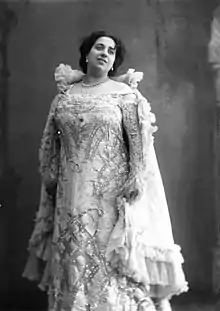Rina Giachetti
Rina Emilia Lucia Giachetti (25 August 1880 – 1 June 1959) was an Italian operatic soprano.
Rina Giachetti | |
|---|---|
 | |
| Born | 25 August 1880 Florence |
| Died | 1 June 1959 Cerreto Guidi |
| Other names | Rina Giacchetti, Rina Pierallini |
| Occupation | Opera singer |
Early life
Rina Emilia Lucia Giachetti was born in Florence in 1880, the daughter of Guido Giachetti and Giuseppina Guidalotti Giachetti. She studied voice with Carlo Carignani in Milan.[1][2]
Career
Giachetti had her opera debut in 1899 in Bizet's Carmen, at the Verdi Theatre in Zadar. She sang in most of the popular operas of her time in Europe, and was a favorite of Puccini's.[3] Her starring roles in Cendrillon (1902), Aida (1903),[4] Tosca (1903), Les Huguenots (1904), Un ballo in maschera (1905), Madama Butterfly (1905), and Fedora (1906). She played Musetta in the first Neapolitan production of Leoncavallo's La bohème in 1902. She shared star billing with Enrico Caruso in Manon in 1902, and toured in South America with Caruso in 1905.[3] She sang at London's Covent Garden often from 1904 to 1908.[5] Her audiences included King Edward VII and Queen Alexandra in Great Britain, Wilhelm II of Germany, and the King and Queen of Portugal.[2]
Personal life and legacy
Rina Giachetti had both intimate and professional associations with Enrico Caruso.[6] Her older sister Ada Botti Giachetti, also an opera singer, was the mother of two sons with Caruso.[3][7] Giachetti married a doctor, Galileo Pierallini. She died in Cerreto Guidi, near Florence, in 1959, aged 78 years.
Giachetti recurs as a figure in popular culture primarily because of her association with Caruso. She was one of the narrating characters in Mary di Michele's novel Tenor of Love (2007).[8][9] She was played by Martina Stella in a biographical drama for Italian television, Caruso, la voce dell'amore (2012).[10] Some of her correspondence with Caruso was part of an archive auctioned by Christie's in 2014.[11]
References
- "Proiezioni". Musica e Musicisti. 58: 523. June 1903.
- "Mme. Rina Giachetti's Operatic Career". Musical Courier. 54: 46. 9 January 1907.
- Caruso, Enrico; Farkas, Andrew (1997). Enrico Caruso: My Father and My Family. Hal Leonard Corporation. pp. 111–119. ISBN 978-1-57467-022-6.
- "News From Palermo". Music News. 24: 365. April 18, 1903.
- Wearing, J. P. (2013-12-05). The London Stage 1900-1909: A Calendar of Productions, Performers, and Personnel. Scarecrow Press. pp. 205–206, 257. ISBN 978-0-8108-9294-1.
- Alda, Frances (2014-12-03). Men, Women and Tenors. Read Books Ltd. ISBN 978-1-4474-9528-4.
- Campbell, Mary (1998-10-11). "Caruso Still Can't Be Beat". Calgary Herald. p. 68. Retrieved 2021-04-01 – via Newspapers.com.
- Michele, Mary di (2007-11-01). Tenor of Love. Simon and Schuster. ISBN 978-1-4165-8552-7.
- Donnelly, Pat (2005-01-15). "Caruso's Voice Seduced the Women of his Age". The Gazette. p. 125. Retrieved 2021-04-01 – via Newspapers.com.
- "Martina Stella: "Per amore sono disposta anche a diventare brutta"". Grazia (in Italian). 2012-05-18. Retrieved 2021-04-01.
- "CARUSO, Enrico (1873-1921). Caruso's personal archive of correspondence, 1897-1908, 1912-1921". Christie's. 2014. Retrieved 2021-04-01.